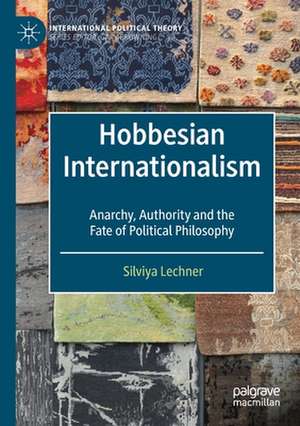Hobbesian Internationalism: Anarchy, Authority and the Fate of Political Philosophy: International Political Theory
Autor Silviya Lechneren Limba Engleză Paperback – 30 dec 2020
| Toate formatele și edițiile | Preț | Express |
|---|---|---|
| Paperback (1) | 466.31 lei 6-8 săpt. | |
| Springer International Publishing – 30 dec 2020 | 466.31 lei 6-8 săpt. | |
| Hardback (1) | 470.72 lei 6-8 săpt. | |
| Springer International Publishing – 9 dec 2019 | 470.72 lei 6-8 săpt. |
Din seria International Political Theory
- 18%
 Preț: 1231.47 lei
Preț: 1231.47 lei -
 Preț: 357.88 lei
Preț: 357.88 lei - 15%
 Preț: 636.45 lei
Preț: 636.45 lei -
 Preț: 158.77 lei
Preț: 158.77 lei -
 Preț: 358.17 lei
Preț: 358.17 lei - 9%
 Preț: 737.57 lei
Preț: 737.57 lei -
 Preț: 382.95 lei
Preț: 382.95 lei - 15%
 Preț: 643.00 lei
Preț: 643.00 lei -
 Preț: 213.97 lei
Preț: 213.97 lei -
 Preț: 385.84 lei
Preț: 385.84 lei - 15%
 Preț: 641.03 lei
Preț: 641.03 lei -
 Preț: 385.84 lei
Preț: 385.84 lei -
 Preț: 394.87 lei
Preț: 394.87 lei - 18%
 Preț: 890.37 lei
Preț: 890.37 lei - 15%
 Preț: 634.14 lei
Preț: 634.14 lei - 15%
 Preț: 635.15 lei
Preț: 635.15 lei - 18%
 Preț: 727.00 lei
Preț: 727.00 lei -
 Preț: 388.72 lei
Preț: 388.72 lei - 15%
 Preț: 642.51 lei
Preț: 642.51 lei - 18%
 Preț: 729.36 lei
Preț: 729.36 lei - 15%
 Preț: 639.08 lei
Preț: 639.08 lei -
 Preț: 391.61 lei
Preț: 391.61 lei -
 Preț: 394.51 lei
Preț: 394.51 lei -
 Preț: 383.93 lei
Preț: 383.93 lei -
 Preț: 389.70 lei
Preț: 389.70 lei - 18%
 Preț: 736.50 lei
Preț: 736.50 lei -
 Preț: 385.62 lei
Preț: 385.62 lei -
 Preț: 388.52 lei
Preț: 388.52 lei -
 Preț: 392.60 lei
Preț: 392.60 lei -
 Preț: 384.86 lei
Preț: 384.86 lei - 15%
 Preț: 638.89 lei
Preț: 638.89 lei -
 Preț: 390.63 lei
Preț: 390.63 lei
Preț: 466.31 lei
Preț vechi: 548.59 lei
-15% Nou
Puncte Express: 699
Preț estimativ în valută:
89.23€ • 93.41$ • 73.83£
89.23€ • 93.41$ • 73.83£
Carte tipărită la comandă
Livrare economică 05-19 aprilie
Preluare comenzi: 021 569.72.76
Specificații
ISBN-13: 9783030306953
ISBN-10: 303030695X
Pagini: 200
Ilustrații: XIV, 200 p. 1 illus.
Dimensiuni: 148 x 210 mm
Greutate: 0.29 kg
Ediția:1st ed. 2019
Editura: Springer International Publishing
Colecția Palgrave Macmillan
Seria International Political Theory
Locul publicării:Cham, Switzerland
ISBN-10: 303030695X
Pagini: 200
Ilustrații: XIV, 200 p. 1 illus.
Dimensiuni: 148 x 210 mm
Greutate: 0.29 kg
Ediția:1st ed. 2019
Editura: Springer International Publishing
Colecția Palgrave Macmillan
Seria International Political Theory
Locul publicării:Cham, Switzerland
Cuprins
PART I. Authority.- Chapter 1. Reading Hobbes as a Theorist of Anarchy and Authority.- Chapter 2. Authority and the Problem of Political Philosophy.- PART II. Anarchy.- Chapter 3. The State of Nature in The Elements.- Chapter 4. The State of Nature in De Cive.- Chapter 5. The State of Nature in Leviathan.- PART III. Hobbes’s Theory of International Relations.- Chapter 6. Hobbes and the International Anarchy.- Chapter 7. Hobbesian Internationalism: Hobbes Meets Kant.- Chapter 8. Challenges: Globalisation and the Resurgence of Private Authority.
Notă biografică
Silviya Lechner was Assistant Professor and is currently a senior visiting research fellow at King’s College London, UK. She specialises in social and political philosophy, theory of action, and international political theory. She is the co-author of Practice Theory and International Relations (with M. Frost, 2018).
Textul de pe ultima copertă
This book sets out to re-examine the foundations of Thomas Hobbes’s political philosophy, and to develop a Hobbesian normative theory of international relations. Its central thesis is that two concepts – anarchy and authority – constitute the core of Hobbes's political philosophy whose aim is to justify the state. The Hobbesian state is a type of authority (juridical, public, coercive, and supreme) which emerges under conditions of anarchy ('state of nature'). A state-of-nature argument makes a difference because it justifies authority without appeal to moral obligation. The book shows that the closest analogue of a Hobbesian authority in international relations is Kant's confederation of free states, where states enjoy 'anarchical' (equal) freedom. At present, this crucial form of freedom is being threatened by economic processes of globalisation, and by the resurgence of private authority across state borders.Silviya Lechner was Assistant Professor and is currently a senior visiting research fellow at King’s College London, UK. She specialises in social and political philosophy, theory of action, and international political theory. She is the co-author of Practice Theory and International Relations (with M. Frost, 2018).
Caracteristici
Shows that Hobbes's political philosophy can illuminate contemporary philosophical debates on the character of political authority and obligation Defends a structuralist explanation of the state of nature as a set of external relations between free and equal agents Offers a comparative analysis of Hobbes’s accounts of morality in The Elements, De Cive, and Leviathan
